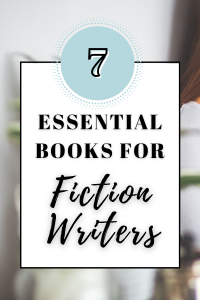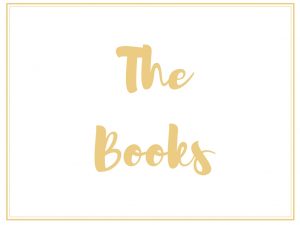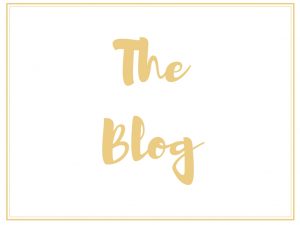7 Essential Books for Fiction Writers

We talk a lot about freelance writing here at the blog, but as many of you know, I’m also a fiction writer who has published the occasional award-winning short story, and has a partially completed novel on the back burner. The novel is waiting patiently for me to organise my business in such a way that the freelance work can become part-time, so it can get some attention. But I still like reading books about writing fiction. It is, in many ways, a more complex form of writing that requires a very different skill set from freelancing.
If you’re an aspiring fiction writer, you may find these books useful. Some are by famous and successful authors, some by much lesser known, but equally valuable, writers. This is a selection of my favourite writing books, designed to inspire and inform the fiction writers or potential fiction writers in my audience.

Disclosure: I’m an Amazon Influencer and Amazon affiliate. When you shop via my influencer shop front or Amazon links, I may earn a commission.
The Elements of Style by William Strunk Jr. And E. B. White
This book is a life saver (or at least a career saver) for all of us who want to be writers but neglected to pay attention in high school English class. This book is not just about improving your grammar and writing style, although if that’s your aim it’s an excellent place to start. It’s about writing strong, concise and meaningful prose. It’s about making every word count, and that’s equally important whether you write short stories or epic novels.
Some of the advice I love, but don’t always follow, includes:
“Write with nouns and verbs. The adjective hasn’t been built that can pull a weak or inaccurate noun out of a tight place.”
And:
“Do not overwrite. Rich, ornate prose is hard to digest, generally unwholesome, and sometimes nauseating.”
And my personal favourite:
“Do not explain too much. It is seldom advisable to tell all.”
The Elements of Style was originally produced by Professor Strunk to be used by his students at Cornell University during the early part of the 20th century. The fact that it still makes perfect sense for modern aspiring writers is an indication of just how timeless good advice can be.
On Writing by Stephen King
Whether you’re a fan of the horror genre or a personal fan of King’s work is irrelevant. On Writing is a book that should probably be on every fiction writer’s bookshelf. This is part memoir/autobiography and part invaluable writing guide. Writer’s autobiographies are often fascinating not because they have led amazing lives (though some certainly have) but because good writers have a way of showing you the early experiences that fired their ambition and shaped their careers.
One thing that King and many other great writers dwell on is the importance of language. When interviewing writers, journalists often ask about plot, characters, ideas, setting, research. We rarely hear a question on how to actually put the words together. Often we assume that’s the easy bit, until we try to produce really great writing ourselves. Often we may think we’ve produced really great writing and it’s only when we look back on it, often after years of trying to perfect our craft, that we realise just how limited by a lack of language knowledge our early attempts were.
If you’re a writer who feels your writing has improved significantly over the years, it probably has less to do with plot or character than it has to do with finally working out how to use language effectively.
The Artist’s Way by Julia Cameron
The Artist’s Way is subtitled ‘A Spiritual Path to Creativity’ but don’t be scared away if you don’t consider yourself ‘spiritual’ or even ‘creative’. There are important lessons to be learnt from this book for frustrated artists everywhere (it works well for writers but is aimed at anyone who wants to be more creative).
While this book is about creativity it’s also pretty practical. A weekly set of tasks in each chapter focuses on firing up that creative side. The author advises, for example, that you try writing a letter from yourself at eighty to your present day self.
“What would you tell yourself?” asks Ms Cameron. “What interests would you urge yourself to pursue? What dreams would you encourage?”
If this doesn’t inspire you to adjust your priorities and focus in on your creative goals, congratulations — you must already be on the right track.
Another task urges you to write down (without thinking too much) twenty things you enjoy doing. Then go through the list and put a date next to each thing indicating when you last did it. (Warning — if you’re like most us with a schedule full of work and family commitments, some of the answers will shock even you). Not only does this re-focus you on what you really want to be doing with your time, but as a bonus you should find twenty themes for new pieces of writing.
There are some great quotes running down the side of each page. They can be applied to art, writing, creativity, and life itself. I like:
“Slow down and enjoy life. It’s not only the scenery you miss by going too fast — you also miss the sense of where you are going and why.” – Eddie Cantor
Reading Like a Writer: A Guide for People Who Love Books and for Those Who Want to Write Them by Francine Prose
Many writing addicts share a common secondary, and interdependent, addiction: reading. A lot of writers would go so far as to say you can’t possibly write fluently unless you read constantly. Unless you’re a celebrity (in which case you can get published without ever reading any book, including your own) it pays to read if you want to be a published writer.
Most of us find that the more we write the more attention we pay to other writer’s work. When we read a particularly strong, striking or hilariously funny paragraph we go back, re-read and deconstruct the hell out of it to see how it was done and what we can learn from it. This book addresses the question of what and how to read, or more specifically how to absorb, apply and benefit from what you read.
If you follow the advice in Reading Like A Writer, every piece of writing you read in future should make you a slightly better writer (including the badly written ones — there’s are few things as useful as learning what not to do). If you love books and want to write them, you need this book.
Beginnings, Middles & Ends by Nancy Kress
A great book for both beginners who don’t know where to start, (or go, or finish) and more experienced writers who may have completed a few good stories but have got stuck and just really need to review the basics.
This book looks at techniques for creating “an opening that works”, a middle that “won’t get you unstuck” and a “climax that does”. Excellent for short story writers, and essential for anyone launching into their first full-length novel. Kress also goes over some important points such as style and structure rules, how to introduce and develop characters, and how to revise your work effectively. There are some really useful practical writing exercises at the end of each chapter.
Advice to Writers: A Compendium of Quotes, Anecdotes, and Writerly Wisdom from a Dazzling Array of Literary Lights by Jon Winokur
This is not Jon Winokur’s only book on writers and writing, but it is, in my opinion, his best. Although it doesn’t set out to be a how-to book, a comprehensive reading will certainly give you tips on how to (and how not to) write, get published, find an agent and many other vital aspects of being a writer.
Advice to Writers is a wonderful, funny and inspiring collection of quotes and anecdotes from an eclectic group of writers, including everyone from P J O’Rourke to Raymond Chandler.
The Writer’s Desk by Jill Krementz
An excellent coffee table book for any writer, or anyone interested in writers and how they create their art. This book is full of stylish black and white photos of writers at their “desks”. As Richard Ford puts it,“my desk is more of a concept than a thing” but these portraits of writers at work are wonderfully intimate and somehow almost universally inspiring.
Each photograph is accompanied by a paragraph about the writer’s work, routines, rituals and writing history. A fascinating glance into the lives of the people I believe should be the true “celebrities”. The people who, over the years, have proved they actually have the talent to inspire and communicate, and the determination to do so in the face of countless rejections, low advances, and ruthless reviews.
Want more book recommendations for both fiction and non-fiction writers? check out the books for writers section of my Amazon shop. It has all my favorites in there, and it’s powered by Amazon so you can shop from it using your regular Amazon account.
*****
Originally posted on Medium.com.
Featured image: Pexels from Pixabay





Be the first to comment.